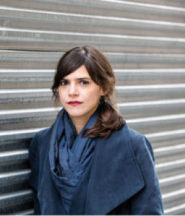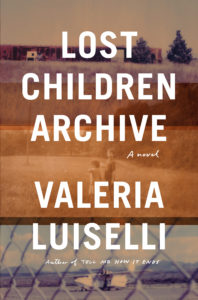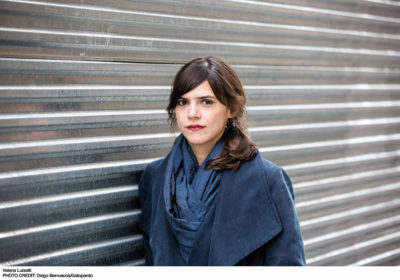Litdish: Valeria Luiselli, Author

Photo Credit: Diego Berruecos Gatopardo
Valeria Luiselli earned her PhD in comparative literature from Columbia University and has received awards from the Los Angeles Times, the Azul Prize, and the National Book Foundation. Her books include Sidewalks, Faces in the Crowd, The Story of My Teeth, Tell Me How It Ends: An Essay in 40 Questions, and now, Lost Children Archive. Her work also appears in The New York Times, Granta, McSweeney’s, and The New Yorker, and has been translated into more than twenty languages.
As the female protagonist, a wife and mother of two, packs books for a cross-country road trip in Luiselli’s latest lyrical, culturally relevant novel, Lost Children Archive, the character ruminates on why citizens of the world read.
“When someone else’s words enter your consciousness like that, they become small conceptual light-marks. They’re not necessarily illuminating,” she muses. “But sometimes a little light can make you aware of the dark, unknown space that surrounds it, of the enormous ignorance that envelops everything we think we know.”
Whether the reader of these thoughts is a writer, MFA student, or lifelong learner, the author encapsulates our own experiences of processing and internalizing literature—to expel some of the darkness in our knowledge bases.
To call Luiselli just a smart writer would be an oversimplification of her broad range. She is prescient but funny, politically brilliant (holding unparalleled knowledge of the child migrant crisis), and incisive but warm: a writing polymath. Lost Children Archive dips and soars on an emotional bell curve while maintaining rigorous attention to literary influences, current events, and story structure.
Luiselli recently spoke with me on the novel writing process, media coverage of the migrant refugee crisis, engagement in differing communities, self-translation, the books we should all read, and word fetishes. Our conversation was humor-filled but so informative—illuminating—much like the experience of reading Luiselli’s work:
E.P. Floyd: Can you talk a little about your writing process for Lost Children Archive? I know you wrote The Story of My Teeth in weekly installments for factory workers, who were your first readers. So, how was this novel writing process different?
Valeria Luiselli: I in fact started writing this novel in that summer of 2014 when the refugee crisis at the border erupted, and I wrote it during the next four years or so. Tell Me How It Ends [Luiselli’s long form essay on her experience as a volunteer translator for migrant children] was a bit of a hiatus from the novel-writing process. That came at a moment when I realized I was using the novel as a vehicle for my own political thought, my political rage, my activism, and I was both spoiling the prose, stuffing it, and also not doing the situation justice by using the novel as that kind of vehicle. So, I had to stop writing the novel for a long time, for about six months, and write Tell Me How It Ends. I was able to articulate what I wanted to articulate in a nonfictional form, more spare and to the point, that purely just denounces the situation, without much more. It’s a very straightforward book—it denounces and portrays. Only then was I able to go back to Lost Children Archive and think about it no longer as an instrument or as a means to an end, but as an exploration in itself.
EPF: That’s fascinating. I didn’t realize that you wrote both at the same time. But, I see it now, the influence.
VL: Right. In many senses, the novel doesn’t answer any question, but it unfolds some of the questions that are asked in Tell Me How It Ends, both the question of what would happen if my own children were alone at the border, and some of the stories left undeveloped completely in Tell Me How It Ends, particularly the story about the two girls, who I actually did meet in court when I started volunteering and translating for kids, and whom I never knew anything about after that one interview. Those are the ghostly presences in the very heart of this novel.
EPF: Are you still keeping up with and are you satisfied with the way the news media in the US is handling the refugee crisis, and what would you like to see more of?
VL: Am I satisfied? No, I’m not satisfied. But, it’s not a US thing. The way that these kinds of narratives are formed is very sensationalist, very much based on a kind of shock politics. As soon as something wears out, the media stops paying attention even though usually the consequences of violence towards communities reach much deeper, and linger for such a long time. Sometimes, even if there’s no shocking headline, things are usually just not covered. We were just talking about things like family separation this past summer. While it was happening, many other things were happening, whose effects are much more long lasting, like little tiny changes to policy, things that are difficult to understand. It’s a kind of reporting that tends to shy away from nuance and complexity, but also from what seem to be boring, technical details. It’s not all about, like, cages and blood—but also the everyday institutional violence that’s not as shiny and not as loud, but that should be reported on.
EPF: Thank you for sharing that, because the female narrator in Lost Children Archive is a journalist, or she identifies as a journalist. There are all these incredible revelations and concerns about how to tell a story and what story to tell in the book. She’s worrying at one point about cultural appropriation, and she lists out all these concerns she has when telling a story:
“Constant concerns: Cultural appropriation, pissing all over someone else’s toilet seat, who am I to tell this story, micromanaging identity politics, heavy-handedness, am I too angry, am I mentally colonized by Western-Saxon-white categories, what’s the correct use of personal pronouns, go light on the adjectives, and oh, who gives a fuck how very whimsical phrasal verbs are?” 
Which concerns of these do you share, and what concerns do you want readers to take away?
VL: I suppose all of the above. We all partake in forms of journalistic or writerly sloppiness and have to be constantly checking ourselves to see where we’re writing from, the things that we’re not looking at, the things that we’re assuming. I think those kind of questions are not the end of a discourse, but the beginning, like you should know where you narrate from in order to from there go into more complex questions. It was very clear for me, writing Tell Me How It Ends, that I belong to the Hispanic community. We belong to many communities at the same time, we’re intersectional, we’re in different worlds at the same time. So, I belong to the Hispanic community, but at the same time I belong to the literary community, which gives me a platform, and at that same time I belong to a community in which I was highly educated here, in a PhD program, so that gives me a certain responsibility, a social responsibility. I try to be very conscious of those things, and I try to also be transparent about where I’m writing from. Tell Me How It Ends, for example, is a book that has a personal strand just for the purpose of disclosing of where I’m speaking from.
EPF: I think you told Democracy Now in 2017 that violence starts with language, but so does resistance. What kind of resistance are you hoping to see from publication and from the effects of the book?
VL: I think if a novel creates a political dent in the world in which it falls, then all the better. I mean if it’s a good one, of course. But I don’t think you can write or walk into a project with that kind of expectation, especially not a fictional work. And that’s exactly why I stopped writing the novel for a period. Because I was trying to do just that and I was, as I said earlier, ruining the novel and not doing justice to the subject. The essay that I wrote, Tell Me How It Ends, is a very different beast. That was a political statement and meant to disclose a very pure, political stance. A novel, I don’t think, can or should do that. It becomes this lofty, heavy-handed, pedagogical thing. A novel needs to be a place where real people breathe, and they have sex, and they pee. [A novel with a political message] really just becomes this instrument for personal politics. It’s terrible. Characters become archetypes and personality becomes only traits. One always hopes that something good will come of it. But I have no expectation in that sense.
EPF: Exactly. A novel with a political message will just feel really forced and…propaganda-esque. One thing I wanted to ask you that doesn’t have much to do with the book—what do you think, besides Lost Children Archive, we should all be reading?
VL: That’s a good question. What should I tell you? There are so many things that are good and important. I just unpacked half of my library. Well, all of my library, actually. I had always had my books in Mexico until I moved to a house. I bought a house in the Bronx last year.
EPF: Oh, congratulations!
VL: Thank you! And then, I was able to ship, after ten years, all my books to New York from Mexico. It’s been really such a discovery to see what I know from the books that had always been my books. They’re mostly philosophy, because I studied philosophy. So, I’ve been opening a few books up and reading them here and there. I’m kind of there in that universe right now, reading little bits and pieces of things that I read long ago—Gadamer’s Truth and Method. Kant, essays on history. No one’s going to pay any attention to this part of the conversation.
EPF: Oh, they will!
Both: (Laugh)
VL: But, you know, this year, there are a couple of interesting books coming out. Samanta Schweblin’s first book, A Mouthful of Birds, is coming out this year in English. I think she wrote it like twelve years ago. That’s an amazing book. Everything she writes is fantastic. I always struggle with this question.
EPF: It’s probably because you read so much to begin with it’s hard to make recommendations. I think that’s a good thing.
VL: There’s also a book by Jackie Wang, Carceral Capitalism, which is about the prison-industrial complex. She brings in a much more complex way of hearing incarceration in the US, incarceration in the criminal justice system, but also in the immigration system. It’s a very good book, a vital book. In translation, Alejandra Pizarnik’s books came out in the last couple of years, and they’re very interesting.
EPF: It looks like you referenced, in an interview with the New School, that you wrote this book in English and then did some self-translating into Spanish. What was that process like?
VL: This book, just like Tell Me How It Ends, I wrote in English. I self-translated Tell Me How It Ends into Spanish. But I’m not self-translating this novel, because it’s just too big of an animal. I attempted it, but I started rewriting it completely. Then I thought, it’s another five years of this. I didn’t want to write the same book twice. Right now I’m revising the Spanish translation, which someone else has done. Several pieces I attempted to write simultaneously in both languages. That was a very naïve project I had at the beginning, which was that I would write the entire novel simultaneously in two languages. The passages I actually managed to write that way were probably some of the best passages in the book. I think the process itself was very fruitful. Were I poet, I would definitely work that way. But I’m not. There are so many other ways. A novel is language, but it’s not only language. It’s not only the words and images. There are so many others layers of consideration. The impulse is different, the rhythm. It worked for me on some pages, but I think it was a naïve thing to think I could do.
EPF: Well, now I’m dying to know, which of those passages did you write in both languages?
VL: That’s a secret.
Both: (Laugh)
VL: To be honest, I don’t remember all of them, but there’s a scene where the girl is sucking her thumb and slowly falling asleep in the back of the car. And then there are echoes of that scene, because there’s a kid in the airplane who’s doing the same thing, he’s being deported and sucking his thumb in the airplane. Those parts I wrote simultaneously. And then several parts of the Elegies [one of the female protagonist’s packed road trip books is Elegies for Lost Children, written by a fictional Italian writer] I wrote simultaneously as well.
EPF: Wow.
VL: And that was kind of fun, because I had originally started writing the Elegies in English, and decided not to circumscribe the Elegies to a specific geographic region or moment in history. But, then when I started playing with them in Spanish, I suddenly realized that I needed—or I wanted—to bring in the language of Central American words in Spanish for objects that exist in the reality of a migrant. Everything from the tube tires, which have a specific name, tubo, to the person who will ferry a group of people across the Rio, the River, the Usumacinta, at the Mexican-Guatemalan border. That person is called a torero. There was this realization of a lot of words in Spanish than I didn’t know because they’re not Mexican, they’re Central American. The fact that that part of a train, the boxcar, is called a gondola, like the boats.
In the end, I’m a writer who absolutely fetishizes words. So, I was really drawn to exploring that linguistic repertoire in Spanish and that circumscribed the story into a region and moment in history. So, I thought, well, I have to bring this back to English. I can’t let the story exist just sort of floating above history and above space. So, it was language and playing and translation that grounded the Elegies in a different way. And I foreignized the Elegies by bringing in terms such as a “gondola.” And, it’s a risky decision, right, because if a reader doesn’t read patiently or wonder, “What do you mean, fucking ‘gondola’?”—they might assume.
The exercise of imagination there is immediate. I think the immediate impulse of the reader is to imagine what you already know as a gondola, an Italian long boat that looks like a bit of a coffin. And then I think there has to be this effort. And I think that that effort is also something that makes literature worth it. That pause and thinking and maybe researching and then understanding, and then saying, “Okay, that’s what it is.”






